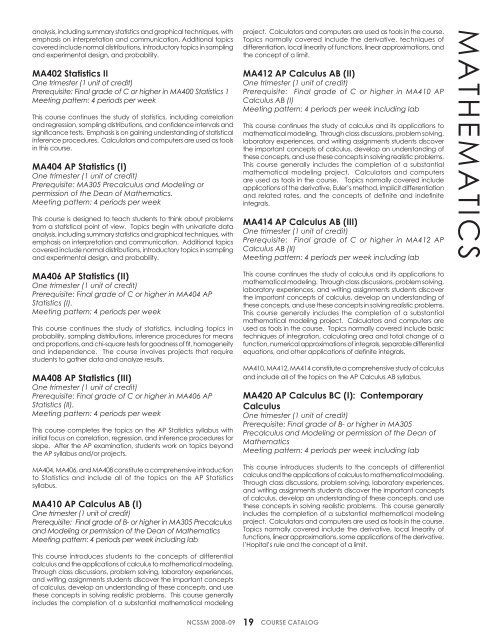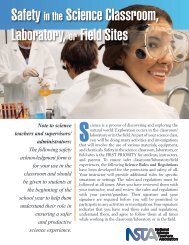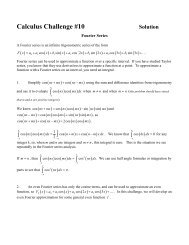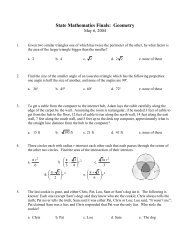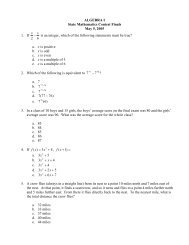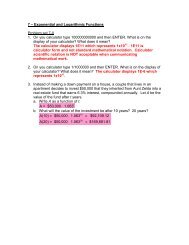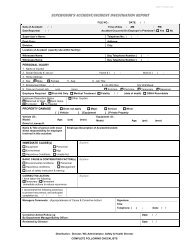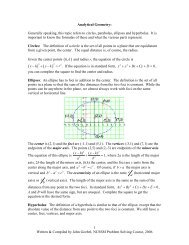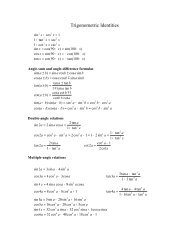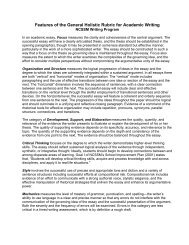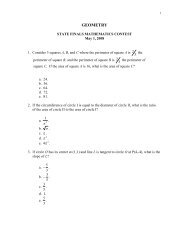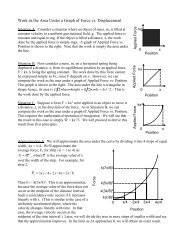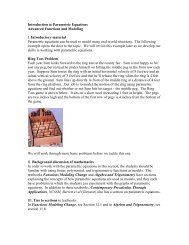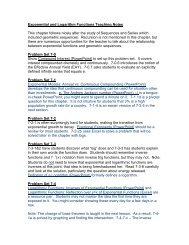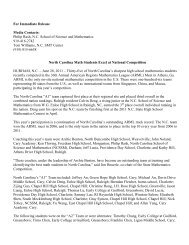Course Catalog - North Carolina School of Science and Mathematics
Course Catalog - North Carolina School of Science and Mathematics
Course Catalog - North Carolina School of Science and Mathematics
- No tags were found...
Create successful ePaper yourself
Turn your PDF publications into a flip-book with our unique Google optimized e-Paper software.
analysis, including summary statistics <strong>and</strong> graphical techniques, withemphasis on interpretation <strong>and</strong> communication. Additional topicscovered include normal distributions, introductory topics in sampling<strong>and</strong> experimental design, <strong>and</strong> probability.MA402 Statistics IIOne trimester (1 unit <strong>of</strong> credit)Prerequisite: Final grade <strong>of</strong> C or higher in MA400 Statistics 1Meeting pattern: 4 periods per weekThis course continues the study <strong>of</strong> statistics, including correlation<strong>and</strong> regression, sampling distributions, <strong>and</strong> confidence intervals <strong>and</strong>significance tests. Emphasis is on gaining underst<strong>and</strong>ing <strong>of</strong> statisticalinference procedures. Calculators <strong>and</strong> computers are used as toolsin this course.MA404 AP Statistics (I)One trimester (1 unit <strong>of</strong> credit)Prerequisite: MA305 Precalculus <strong>and</strong> Modeling orpermission <strong>of</strong> the Dean <strong>of</strong> <strong>Mathematics</strong>.Meeting pattern: 4 periods per weekThis course is designed to teach students to think about problemsfrom a statistical point <strong>of</strong> view. Topics begin with univariate dataanalysis, including summary statistics <strong>and</strong> graphical techniques, withemphasis on interpretation <strong>and</strong> communication. Additional topicscovered include normal distributions, introductory topics in sampling<strong>and</strong> experimental design, <strong>and</strong> probability.project. Calculators <strong>and</strong> computers are used as tools in the course.Topics normally covered include the derivative, techniques <strong>of</strong>differentiation, local linearity <strong>of</strong> functions, linear approximations, <strong>and</strong>the concept <strong>of</strong> a limit.MA412 AP Calculus AB (II)One trimester (1 unit <strong>of</strong> credit)Prerequisite: Final grade <strong>of</strong> C or higher in MA410 APCalculus AB (I)Meeting pattern: 4 periods per week including labThis course continues the study <strong>of</strong> calculus <strong>and</strong> its applications tomathematical modeling. Through class discussions, problem solving,laboratory experiences, <strong>and</strong> writing assignments students discoverthe important concepts <strong>of</strong> calculus, develop an underst<strong>and</strong>ing <strong>of</strong>these concepts, <strong>and</strong> use these concepts in solving realistic problems.This course generally includes the completion <strong>of</strong> a substantialmathematical modeling project. Calculators <strong>and</strong> computersare used as tools in the course. Topics normally covered includeapplications <strong>of</strong> the derivative, Euler’s method, implicit differentiation<strong>and</strong> related rates, <strong>and</strong> the concepts <strong>of</strong> definite <strong>and</strong> indefiniteintegrals.MA414 AP Calculus AB (III)One trimester (1 unit <strong>of</strong> credit)Prerequisite: Final grade <strong>of</strong> C or higher in MA412 APCalculus AB (II)Meeting pattern: 4 periods per week including labMATHEMATICSMA406 AP Statistics (II)One trimester (1 unit <strong>of</strong> credit)Prerequisite: Final grade <strong>of</strong> C or higher in MA404 APStatistics (I).Meeting pattern: 4 periods per weekThis course continues the study <strong>of</strong> statistics, including topics inprobability, sampling distributions, inference procedures for means<strong>and</strong> proportions, <strong>and</strong> chi-square tests for goodness <strong>of</strong> fit, homogeneity<strong>and</strong> independence. The course involves projects that requirestudents to gather data <strong>and</strong> analyze results.MA408 AP Statistics (III)One trimester (1 unit <strong>of</strong> credit)Prerequisite: Final grade <strong>of</strong> C or higher in MA406 APStatistics (II).Meeting pattern: 4 periods per weekThis course completes the topics on the AP Statistics syllabus withinitial focus on correlation, regression, <strong>and</strong> inference procedures forslope. After the AP examination, students work on topics beyondthe AP syllabus <strong>and</strong>/or projects.MA404, MA406, <strong>and</strong> MA408 constitute a comprehensive introductionto Statistics <strong>and</strong> include all <strong>of</strong> the topics on the AP Statisticssyllabus.MA410 AP Calculus AB (I)One trimester (1 unit <strong>of</strong> credit)Prerequisite: Final grade <strong>of</strong> B- or higher in MA305 Precalculus<strong>and</strong> Modeling or permission <strong>of</strong> the Dean <strong>of</strong> <strong>Mathematics</strong>Meeting pattern: 4 periods per week including labThis course introduces students to the concepts <strong>of</strong> differentialcalculus <strong>and</strong> the applications <strong>of</strong> calculus to mathematical modeling.Through class discussions, problem solving, laboratory experiences,<strong>and</strong> writing assignments students discover the important concepts<strong>of</strong> calculus, develop an underst<strong>and</strong>ing <strong>of</strong> these concepts, <strong>and</strong> usethese concepts in solving realistic problems. This course generallyincludes the completion <strong>of</strong> a substantial mathematical modelingThis course continues the study <strong>of</strong> calculus <strong>and</strong> its applications tomathematical modeling. Through class discussions, problem solving,laboratory experiences, <strong>and</strong> writing assignments students discoverthe important concepts <strong>of</strong> calculus, develop an underst<strong>and</strong>ing <strong>of</strong>these concepts, <strong>and</strong> use these concepts in solving realistic problems.This course generally includes the completion <strong>of</strong> a substantialmathematical modeling project. Calculators <strong>and</strong> computers areused as tools in the course. Topics normally covered include basictechniques <strong>of</strong> integration, calculating area <strong>and</strong> total change <strong>of</strong> afunction, numerical approximations <strong>of</strong> integrals, separable differentialequations, <strong>and</strong> other applications <strong>of</strong> definite integrals.MA410, MA412, MA414 constitute a comprehensive study <strong>of</strong> calculus<strong>and</strong> include all <strong>of</strong> the topics on the AP Calculus AB syllabus.MA420 AP Calculus BC (I): ContemporaryCalculusOne trimester (1 unit <strong>of</strong> credit)Prerequisite: Final grade <strong>of</strong> B- or higher in MA305Precalculus <strong>and</strong> Modeling or permission <strong>of</strong> the Dean <strong>of</strong><strong>Mathematics</strong>Meeting pattern: 4 periods per week including labThis course introduces students to the concepts <strong>of</strong> differentialcalculus <strong>and</strong> the applications <strong>of</strong> calculus to mathematical modeling.Through class discussions, problem solving, laboratory experiences,<strong>and</strong> writing assignments students discover the important concepts<strong>of</strong> calculus, develop an underst<strong>and</strong>ing <strong>of</strong> these concepts, <strong>and</strong> usethese concepts in solving realistic problems. This course generallyincludes the completion <strong>of</strong> a substantial mathematical modelingproject. Calculators <strong>and</strong> computers are used as tools in the course.Topics normally covered include the derivative, local linearity <strong>of</strong>functions, linear approximations, some applications <strong>of</strong> the derivative,l’Hopital’s rule <strong>and</strong> the concept <strong>of</strong> a limit.NCSSM 2008-0919COURSE CATALOG


